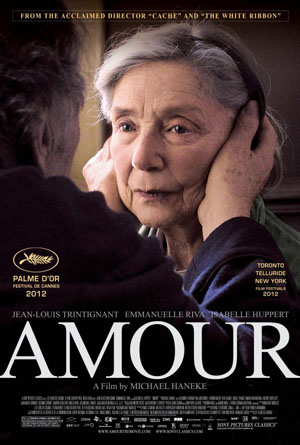- Title: Amour
- IMDB: link

 If you have any personal experience with watching a loved one suffer a stroke or face the slow and debilitating end-of-life process writer/director Michael Haneke‘s Amour is likely to hit closer to home than you may like. Haneke’s tale is as simple as it is heartfelt, showcasing the strain of a stroke on the lives and the marriage of an elderly couple in their final months together.
If you have any personal experience with watching a loved one suffer a stroke or face the slow and debilitating end-of-life process writer/director Michael Haneke‘s Amour is likely to hit closer to home than you may like. Haneke’s tale is as simple as it is heartfelt, showcasing the strain of a stroke on the lives and the marriage of an elderly couple in their final months together.
Although there are cameo roles which include the couple’s daughter (Isabelle Huppert) and a former piano student (Alexandre Tharaud), Amour is really centered around the performances of Jean-Louis Trintignant as George and Emmanuelle Riva as his wife Anne. The entire film never leaves the walls in which the pair have made their home together which slowly becomes a prison for both of them when Anne suffers a second stroke.
Despite its success overseas, and several awards to its credit on this side of the Atlantic, Amour is only now slowly being released in the United States. You may have to search to find it, but despite its difficult subject matter it’s worth the wait.
My complaints with Haneke’s film are minor, but worth mentioning. They mainly deal with the film’s final act where the script, which has been so willing to let us in on every aspect of the difficult day-to-day life of taking care of a stroke victim, gets a little murky as to the final fate of one of our two main characters. I’m also not sure, despite a pair of terrific performances, that the film lends itself to multiple viewings.
These quibbles, however, are minor and there’s certainly no argument that Amour is one of the best films you will be able to find in theaters (although you might have to search a local art house for this one). The French film is presented with English subtitles, but the emotion of the several of the movie’s scenes needs no translation. Haneke delivers a moving film about harsher side to loving and sharing your life with someone than you’re likely to find in your typical Hollywood films. Amour isn’t a complex film, but George’s story of responsibility, love, and fidelity under the weight of circumstances beyond his control is a moving, even haunting, tale which will stay with you long after the credits roll.
